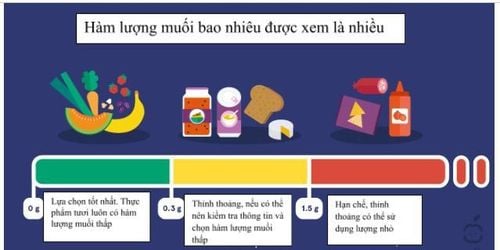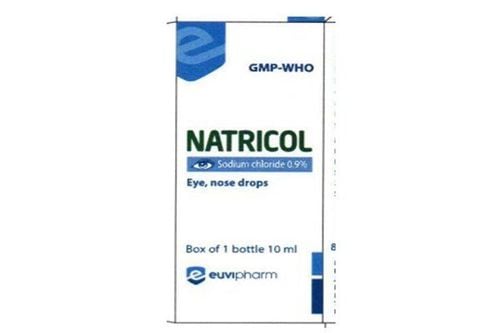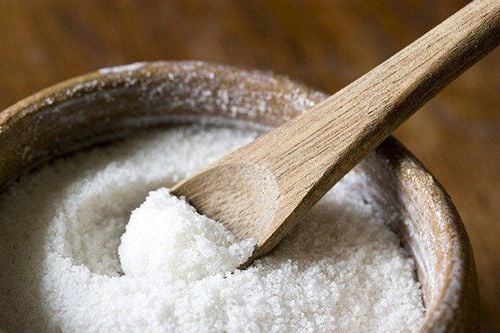This is an automatically translated article.
The article was written by MSc La Thi Thuy - Interventional Cardiologist, Cardiology Center - Vinmec Central Park International General HospitalSalt is a spice that has been used to flavor and preserve foods for thousands of years. We all need salt for good health, but eating too much can raise blood pressure, increasing the risk of cardiovascular disease.
1. What is salt?
Salt is the common name for sodium chloride (NaCl). It consists of 40% sodium and 60% chloride, in other words 2.5g of salt contains 1g of sodium and 1.5g of chloride.
2. Why do we need salt?
Both sodium and chloride are needed for many bodily functions. They help regulate blood pressure, control fluid balance, maintain the right conditions for muscle and nerve function, and enable the absorption and transport of nutrients across cell membranes. Chloride is also used to produce stomach acid (hydrochloric acid, HCl) that helps digest food.3. How much salt does the body need every day?
The exact minimum daily salt requirement is unknown, but it is thought to be around 1.25 g - 2.5 g (0.5 - 1 g sodium) per day. Since salt is found in many foods, the risk of deficiency is low.
>>> Salt: How much is enough per day?
The European Food Safety Authority (EFSA) has stated that a daily salt intake of 5g (2g sodium) is sufficient to meet both our sodium and chloride requirements as well as reduce the risk of high blood pressure. pressure and heart disease. This equates to about 1 teaspoon of salt per day from all sources.
Both sodium and chloride are eliminated from the body through urine and when we sweat. This means that episodes of heavy sweating, such as during exercise, can increase our salt needs slightly. However, since most people consume more than necessary, it is not usually necessary to increase salt intake under these conditions.

4. What is the blood pressure reading?
Blood pressure is a measure of the pressure the heart uses to pump blood around the body. There are two distinct blood pressure readings, systolic pressure (the highest pressure on blood vessels when the heart pushes blood out) and diastolic pressure (the lowest pressure on blood vessels when the heart is at rest between beats). . Both are measured in millimeters of mercury (mmHg) and are usually presented as a systolic/diastolic ratio (e.g., 120/80 mmHg).In general, a healthy blood pressure is said to be between 90/60 mmHg and 120/80 mmHg. High blood pressure (also called hypertension) is commonly defined as a measurement of 140/90mmHg or higher and is a risk factor for many diseases, especially heart disease and stroke.
| Phân độ huyết áp | Tâm thu (mmHg) | Tâm trương (mmHg) |
| Huyết áp thấp | <90 | <60 |
| Tối ưu | 90-120 | 60-80 |
| Trung bình | 120-129 | 80-84 |
| Trung bình cao (tăng/ tiền tăng huyết áp) | 129-139 | 85-89 |
| Tăng huyết áp | ≥140 | ≥90 |
5. How does salt raise blood pressure?
Normally, the kidneys are responsible for regulating the amount of sodium and water in the blood. However, for many people, eating too much salt can upset this balance, causing the amount of sodium in the blood to rise. This causes the body to retain more water and increases both the fluid that surrounds the cells and the volume of blood in the blood.
As the amount of blood increases, the pressure on the blood vessels begins to increase and the heart needs to work harder to transport blood around the body. Over time, this stress can lead to hardening of the blood vessels and increase the risk of high blood pressure, heart disease and stroke.
>>> Build a menu for people with heart disease
6. Does reducing salt improve blood pressure values?
There is a lot of consistent evidence that a moderate reduction in salt intake (3-5 grams or 1/2 -1 teaspoon per day) can lead to a reduction in blood pressure. However, the effects of salt reduction may not be the same for everyone, and will depend on each patient's baseline blood pressure (most pronounced in patients with low blood pressure). higher), current salt intake, genetics, medical conditions, and medication use.
It is important to note that salt is not the only lifestyle factor that can affect blood pressure readings. Other factors include: eating enough potassium, maintaining an ideal weight, not smoking, and being physically active are also important for lowering blood pressure values.

7 lời khuyên về lối sống giúp điều chỉnh trị số huyết áp
7.5 tips to reduce salt intake
Most of the salt we consume comes from prepared convenience foods, as well as foods that are prepared outside. Here are some tips to help you reduce your salt intake:Avoid adding salt to foods or use low sodium table salt Even foods that don't taste salty like cereal or bread can be high in salt. Always check the nutrition facts and choose low-salt varieties when possible Choose unsalted nuts, seeds, and other snacks instead of salt Use herbs and spices instead of salt to Add flavor to food Pay attention to foods eaten out and ask for less salt if possible In addition to building a scientific diet, regular health checks help detect diseases early, thereby planning treatment achieves optimal results. Currently, Vinmec International General Hospital has general health checkup packages suitable for each age, gender and individual needs of customers with a reasonable price policy, including:
Health checkup package diamond general health checkup package Vip general health checkup special health checkup package Comprehensive general health checkup package standard general health checkup The patient's examination results will be returned to your home. After receiving the results of the general health examination, if you detect diseases that require intensive examination and treatment, you can use services from other specialties right at the Hospital with quality treatment and services. outstanding customer service.
Please dial HOTLINE for more information or register for an appointment HERE. Download MyVinmec app to make appointments faster and to manage your bookings easily.













